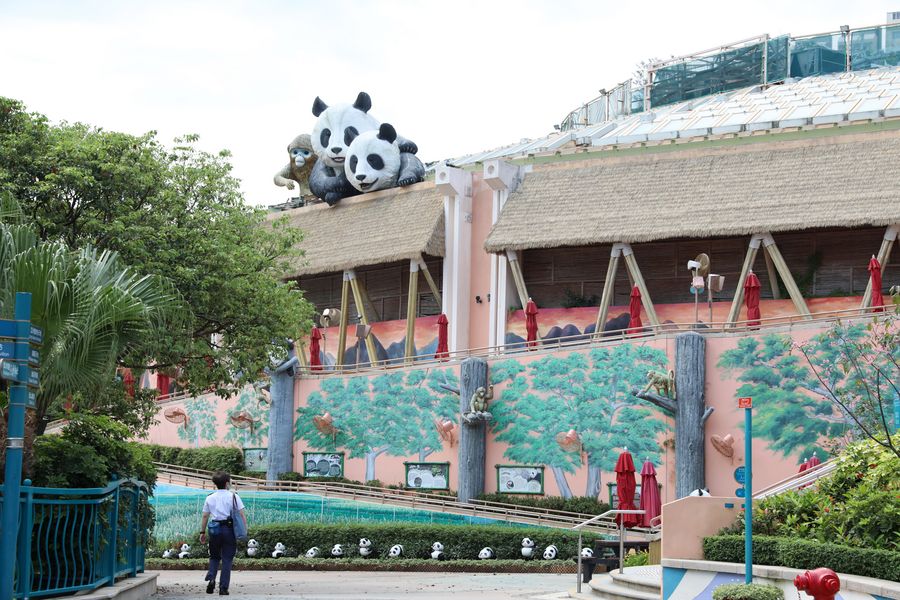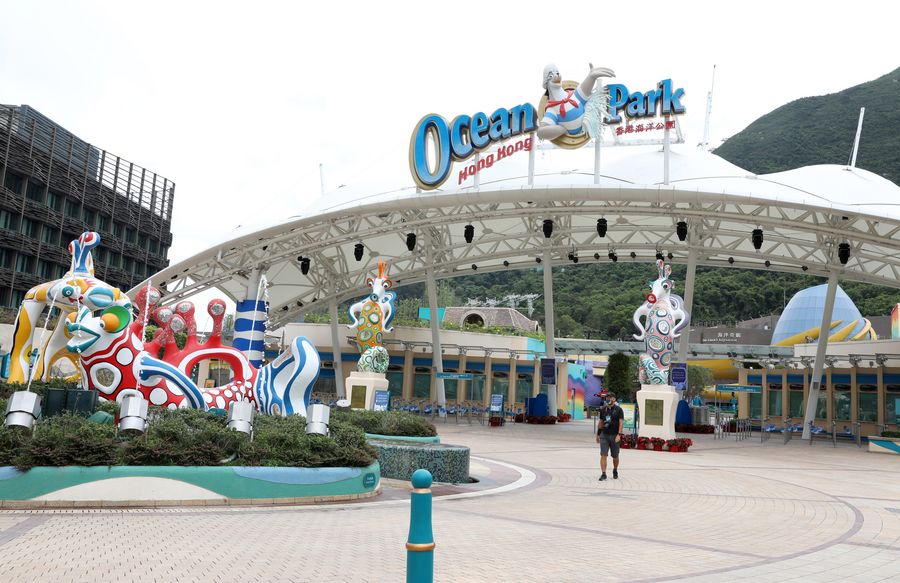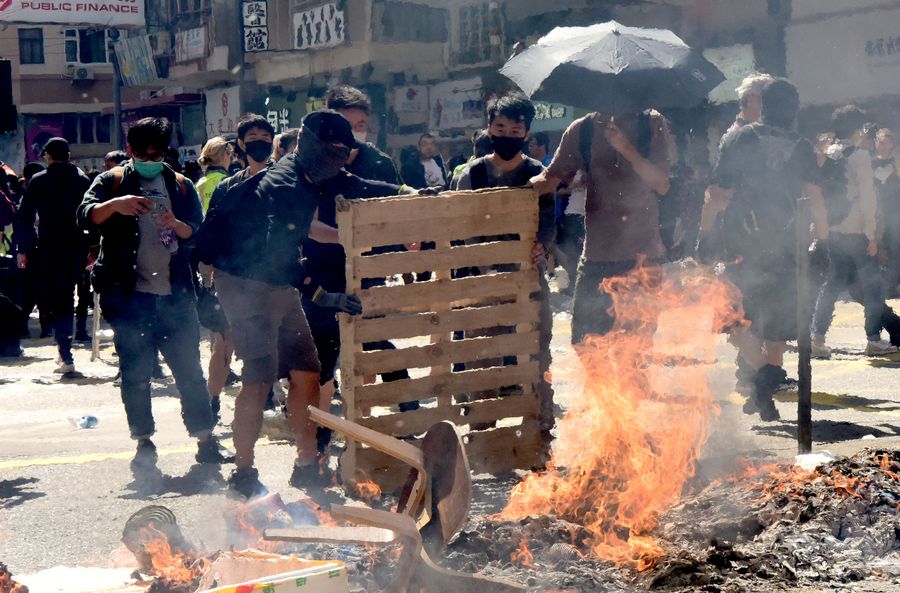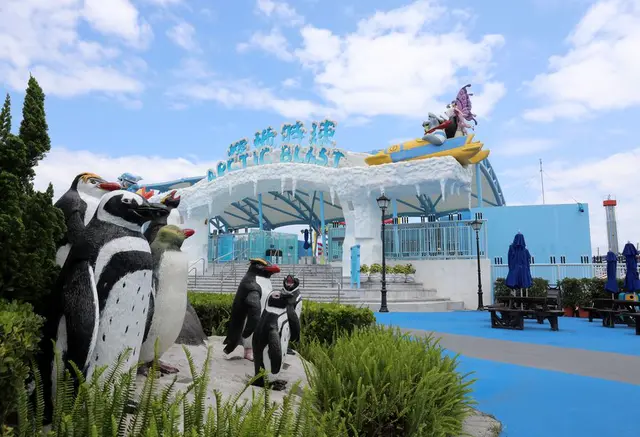- "The COVID-19 pandemic will eventually be contained, but what about the violence? How do we expect visitors to come if Hong Kong is known to the world as a place plagued with violence?"
HONG KONG, May 19 (Xinhua) -- The fate of Hong Kong's signature Ocean Park continues to hang in the balance as the Hong Kong Special Administrative Region (HKSAR) Legislative Council (LegCo) on Tuesday failed once again to decide whether to approve the government's proposed emergency funding to keep the park from going bust.
Opinions have been deeply divided as to whether the HKSAR government should spend 5.4 billion Hong Kong dollars (697 million U.S. dollars) to keep Ocean Park afloat over the next 12 months or allow it to go into bankruptcy.
Without the urgent bailout, the 43-year-old theme park could be forced to shut down by the end of June, putting the wellbeing of some 4,000 full-time and part-time staff as well as about 7,500 animals in the park at risk.
Visitors from the Chinese mainland have contributed to a large part of Ocean Park's ticket revenue, taking up over half of the total visitors in 2003 when the Individual Visit Scheme for mainland travellers began. In the following decade, the park's visitor number grew from 3.7 million in 2003-04 to over 7 million in 2012-13, when it was recognized as the World's Top Theme Park by the prestigious Applause Award.
Since June of last year, however, Hong Kong has been grappling with a prolonged social unrest characterized by a string of violent incidents. As a result, the park is rapidly losing its largest visitor market.
During the July-December period last year, Ocean Park received merely 1.9 million visitors, an over 30-percent plunge from the previous year.
The COVID-19 outbreak has deepened the financial crisis as the park, along with other attractions such as Hong Kong Disneyland, temporarily stopped operations in late January.

Photo taken on May 11, 2020 shows the Hong Kong Ocean Park in south China's Hong Kong. (Xinhua/Wu Xiaochu)
According to the park's report to the Hong Kong LegCo, it estimated a 600-million-Hong Kong-dollar (77.4 million U.S. dollars) cash deficit in the 2019-2020 period, up from 557.3 million Hong Kong dollars (71.9 million U.S. dollars) for 2018-2019 and 236.5 million Hong Kong dollars (30.5 million U.S. dollars) for the previous year.
The park had initially sought a cash injection of 10.64 billion Hong Kong dollars (1.37 billion U.S. dollars) from the HKSAR government in January for redevelopment and financial burden alleviation.
However, given the COVID-19 pandemic and the rapidly changing global tourism landscape that followed, the government on May 11 proposed a revised bailout package of 5.4 billion Hong Kong dollars (697 million U.S. dollars).
The new funding proposal aims at supporting the park's operation in the next 12 months and paying off a commercial debt of around 3 billion Hong Kong dollars (387 million U.S. dollars) so that the park could avoid liquidation.
If Ocean Park is eventually shut down, some 10 billion Hong Kong dollars (1.29 billion U.S. dollars) will be needed to repay commercial loans, rehouse the animals and pay off employees, among others, according to the parks' deputy chairman Lau Ming-wai.
"It will not have a beautiful ending if the park closes for good," Lau told local media.

Photo taken on May 8, 2020 shows the Hong Kong Ocean Park in south China's Hong Kong. (Xinhua/Wu Xiaochu)
Industry insiders said the predicament of Ocean Park is a vivid reflection of Hong Kong's tourism, which provides nearly 257,000 jobs.
Hong Kong's unemployment rate surged to 4.2 percent during the period of January to March 2020, the highest in more than nine years, according to the HKSAR government. The tourism and consumption-related sectors were among the hardest-hit, with a combined unemployment rate of 6.8 percent.
"Since August last year, half of Hong Kong's tour guides have been out of work, and almost all of them have been out of work since this Spring Festival," said Lam Chi-ting, secretary-general of the Federation of Hong Kong Trade Unions in Tourism.
Hong Kong's tourism has plunged into an "ice age", said Sara Leung, chairwoman of the Hong Kong Tourism Industry Employees' General Union.
As the COVID-19 outbreak is currently under control in Hong Kong, the HKSAR government began to relax certain social distancing measures. While the hard-won improvement in the pandemic situation in Hong Kong has yet to bring relief to residents, violence is returning to streets.
During the International Labor Day holiday, radicals held illegal assemblies, disrupted shops and threw petrol bombs on the streets.
Since last year, rioters have been wreaking havoc on Hong Kong, besieging public agencies, trashing metro stations, banks and stores and even beating up tourists and residents.
The violence, under the "burn with us" mentality, is the source of the hardship of Hong Kong residents and the closures of businesses, a spokesperson of the Liaison Office of the Central People's Government in the HKSAR said on May 2.

Rioters set fire to paralyze traffic in Sai Wan Ho, south China's Hong Kong, Nov. 11, 2019. (Xinhua)
Facing the threat of street violence in the short term and the challenge of a changing tourism prospect in the long term, many believed what Ocean Park needs is not a "band-aid", but a "surgery."
To survive the future, Ocean Park needs to re-adjust its position, improve management and find ways to keep local visitors, lure visitors back from the mainland and explore overseas markets, industry insiders said.
"The COVID-19 pandemic will eventually be contained, but what about the violence? How do we expect visitors to come if Hong Kong is known to the world as a place plagued with violence?" asked Leung.
Now with the return of street violence, Ocean Park is feared to become the next victim of "burn with us," she said. ■
 简体中文
简体中文











